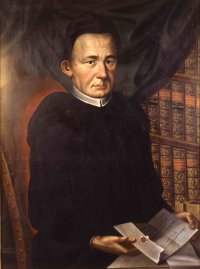Karl Meichelbeck
Karl Meichelbeck OSB (born May 29, 1669 in Oberdorf im Allgäu as Johann Georg Meichelbeck ; † April 2, 1734 in Benediktbeuern ) is generally considered to be the most important monk of the Benediktbeuern monastery .
biography
Johann Georg (= baptismal name ) Meichelbeck completed his grammar school studies at the Munich Jesuit high school in 1687 .
On October 5, 1687, Meichelbeck entered the Benediktbeuern Abbey as a postulant . The clothing with the tonsure took place on November 24, 1687. After the novitiate in the convent in Prüfing , he made his profession on December 21, 1688 in Benediktbeuern , where he took the religious name Karl. His subdeacon ordination took place in Salzburg on March 7, 1693, and his deacon ordination on March 21 of the same year. He was ordained a priest on September 18, 1694 in Augsburg and celebrated his primacy a month later .
Meichelbeck was from October 8, 1701 a lecturer in philosophy at the college of the Bavarian Benedictines in the monastery of Rott am Inn , from October 20, 1705 professor of theology . On August 25, 1708, Karl Meichelbeck was appointed historian of the Bavarian Benedictine Congregation and released from teaching duties.
His first major work was the two-volume history of the Diocese of Freising ("Historia Frisingensis"), which he wrote from 1724 to 1729 on behalf of Prince-Bishop Eckhers . It was based on documented sources and is considered the first of its kind in the Catholic German-speaking area.
His second major work was a Latin chronicle of the Benedictine monastery Benediktbeuern ("Chronicon Benedictoburanum"), completed in 1730, but not printed until 1751/52 (according to other information, 1753). At that time it caused a sensation in the professional world because of its new approach, although it was not the first published monastery history using this method because of the late printing. From 1730 to 1731 Meichelbeck also created an “Archivum Benedictoburanum”. In 1732 he wrote a slightly shortened German version of his Chronicons Benedictoburanum as a manuscript.
In his “Historia” and his “Chronicon” Meichelbeck, who actually had no historian training, consistently uses the (adopted by the French masons and only from correspondence with contemporary historians, e.g. Bernhard Pez , and in particular through the writings of Jean Mabillon known) the method of historiography based on original sources (documents and manuscripts) and also critically checking these sources for truthfulness, in contrast to the previously practiced mere adoption of traditional knowledge. Not least because of this method, Meichelbeck achieved several legal successes in upholding the contentious claims of monasteries and orders of the Benedictines. With his meticulously created works, Meichelbeck played a decisive role in the spread of scientific historiography in German-speaking countries.
The Karl-Meichelbeck-Realschule in Freising is named after him.
literature
- Anton Baumgärtner : Meichelbeck's history of the city of Freising and its bishops . Freising, 1854.
- Ulrich Neumann: Karl Meichelbeck. In: Biographisch-Bibliographisches Kirchenlexikon (BBKL). Volume 5, Bautz, Herzberg 1993, ISBN 3-88309-043-3 , Sp. 1157-1160.
- Ludwig Hammermayer : Meichelbeck, Karl. In: New German Biography (NDB). Volume 16, Duncker & Humblot, Berlin 1990, ISBN 3-428-00197-4 , pp. 634-637 ( digitized version ).
- Edmund Freiherr von Oefele : Meichelbeck, Karl . In: Allgemeine Deutsche Biographie (ADB). Volume 21, Duncker & Humblot, Leipzig 1885, p. 188 f.
Web links
- Digitized works by and about Karl Meichelbeck in the German Digital Library
- Detailed biography of Norbert Wolff
- Karl Meichelbeck's estate in the Bavarian State Library
Individual evidence
- ^ Max Leitschuh: The matriculations of the upper classes of the Wilhelmsgymnasium in Munich , 4 volumes, Munich 1970–1976; Volume 2, p. 35.
- ↑ http://www.mdz-nbn-resolving.de/urn/resolver.pl?urn=urn:nbn:de:bvb:12-bsb10623038-1
- ↑ in the Bavarian State Library as a manuscript under Meichelbeckiana No. 7
- ↑ available online under Archived Copy ( Memento of the original dated February 25, 2014 in the Internet Archive ) Info: The archive link was inserted automatically and has not yet been checked. Please check the original and archive link according to the instructions and then remove this notice.
| personal data | |
|---|---|
| SURNAME | Meichelbeck, Karl |
| ALTERNATIVE NAMES | Meichelbeck, Johann Georg (maiden name) |
| BRIEF DESCRIPTION | Benedictine priest of the Benediktbeuern monastery, church historian |
| DATE OF BIRTH | May 29, 1669 |
| PLACE OF BIRTH | Oberdorf in the Allgäu |
| DATE OF DEATH | April 2, 1734 |
| Place of death | Benediktbeuern |
